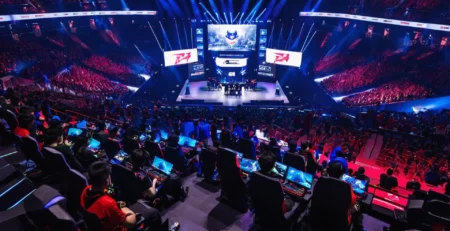Esports’ Place in Popular Culture
Overview of Esports in Popular Culture:
In recent years, esports has evolved from specialized online tournaments to a significant force in popular culture worldwide. This rise in popularity underscores the expanding impact of digital entertainment and indicates a more significant cultural shift. This piece examines esports’ place in popular culture, how it affects other industries, and the future of this evolving field.
1. The Esports Revolution
1.1. Overview of History
Electronic sports, or esports, have roots in competitive video games and date back to the 1970s. Simple tournaments were held initially, but substantial growth was fuelled by the development of the internet and other technological breakthroughs. By the 2000s, esports had developed worldwide, with professional leagues, enormous competitions, and devoted fan communities.
1.2. Important Turning Points
Esports have grown in response to several turning points. When websites like Twitch debuted in 2011, the way gamers shared and watched videos changed. Esports gained legitimacy as a respectable form of entertainment when significant events like the League of Legends World Championship and The International (Dota 2) drew millions of spectators.
2. Sports and Journalism
2.1. Broadcasting and Streaming
Esports have grown substantially thanks to streaming platforms like Twitch and YouTube Gaming. These platforms promote interaction and community by enabling players to stream their gaming in real time. The popularity of esports streaming has also raised revenue-generating possibilities for sponsorships, ads, and subscription services.
2.2. Integration of Mainstream Media
Traditional media outlets have begun recognizing esports, with networks like ESPN and BBC covering big tournaments. The widespread acknowledgement of esports as a noteworthy cultural phenomenon has enhanced exposure and a wider viewership.
3. Esports’ Economic Impact
3.1. Generation of Revenue
Esports is a profitable sector that generates billions of dollars in revenue annually. Sponsorships, advertising, product sales, and live event ticket sales are essential sources of income. Well-known companies, including Intel, Coca-Cola, and Nike, have invested significantly in esports, realizing its potential to connect with younger, tech-savvy consumers.
3.2. Creation of Jobs
The advent of esports has made many job options possible, from athletes and coaches at the highest levels to those in charge of events and those who create media. This growth has supported careers and promoted economic development in the entertainment sector.
Fourth, Social Dynamics and Esports
4.1. Establishing a Community
Vibrant online communities have been fostered by esports, allowing fans and players to connect over shared interests. These communities add to the cultural value of esports by providing a feeling of identification and belonging. Fans can connect and celebrate their passion on forums, fan conventions, and social media groups.
4.2. Inclusion and Diversity
Esports has done a great job of encouraging inclusivity and diversity. Several initiatives and organizations are in place to guarantee that players from varied backgrounds have the chance to participate and succeed. Furthermore, initiatives to address problems like harassment and toxicity seek to make the space more inviting for all participants.
Fifth, Esports’ Impact on Youth Culture
5.1. A Career in Gaming
The idea that gaming is a legitimate professional path has changed due to esports. Young gamers now look forward to professional players, trainers, and content producers as role models, encouraging them to seek professions in gaming and associated industries. Due to this change, esports-related educational initiatives and scholarships have become more prevalent.
5.2. Shifting Social Conventions
Esports has altered gaming-related social norms. Gaming was once considered a solitary hobby, but it is today seen as a sociable and competitive activity. This transformation indicates a more significant shift in how society perceives digital entertainment and its daily function.
6. Esports’ Prospects
6.1. Developments in Technology
The development of technology has a direct bearing on the future of esports. Computer programs that simulate human intelligence, often known as AI, AR, and VR innovations, are predicted to improve gaming and open up new avenues for competitive play. These technologies may completely change the way esports tournaments are organized and watched.
6.2. International Growth
Esports is expected to keep growing internationally. Emerging markets like South America and Africa are getting more active, even as established markets in North America, Europe, and Asia continue to thrive. This international reach is expected to provide diversity to the esports scene and draw new fans.
In summary
Esports are now a well-established and essential part of popular culture. Their importance in modern society is reflected in their effect on media, economics, social dynamics, and young culture. As technology advances and the sector grows, esports is expected to become ever more significant in determining the direction of entertainment in the future. The development of esports is evidence of digital innovation’s influence on changing cultural norms.











Comments (2)
Awesome read! Esports has truly become a cultural phenomenon, shaping trends and bringing communities together. Excited to see where it goes next!
Great article! Esports is making a massive impact on popular culture, blending gaming with entertainment and influencing trends across the globe!